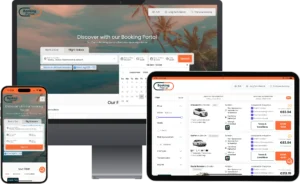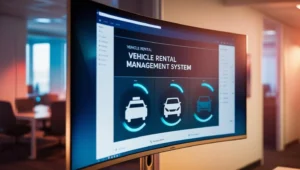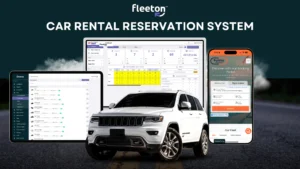Car rental reservation systems play a crucial role in providing convenience and efficiency to both car rental companies and customers. In this comprehensive guide, we will explore the key features of these systems, the role of technology in their development, how to choose the right system, the benefits of using one, potential challenges and solutions in implementation, and the future trends in car rental reservation systems.
Understanding Car Rental Reservation Systems
Car rental reservation systems are sophisticated software applications that allow customers to book vehicles for a specific period. These systems streamline the reservation process and provide a centralized platform for managing vehicle availability, pricing, and customer information. They facilitate seamless communication between car rental companies and their customers, ensuring a smooth experience for both parties.
When it comes to car rental reservation systems, there are several key features that enhance efficiency and streamline operations. These features are designed to make the booking process as seamless as possible for customers while providing car rental companies with the tools they need to effectively manage their fleet and reservations.
Key Features of Car Rental Reservation Systems
Car rental reservation systems offer a wide range of features to enhance efficiency and streamline operations. Let’s take a closer look at some of the key features:
- Online booking: Customers can book vehicles through a user-friendly online interface, with real-time availability and pricing information. This feature eliminates the need for customers to visit a physical location or make phone calls to reserve a vehicle. With just a few clicks, customers can easily browse available vehicles, select their desired dates and times, and complete their reservation.
- Inventory management: The system tracks vehicle availability and automatically updates inventory as bookings are made. This feature ensures that customers have accurate information about vehicle availability and prevents double bookings. It also allows car rental companies to effectively manage their fleet, ensuring that vehicles are properly maintained and serviced.
- Reservation management: Car rental companies can easily manage reservations, view customer details, and modify or cancel bookings. This feature provides car rental companies with a centralized platform to handle all aspects of the reservation process. From managing customer information to making changes to existing reservations, this feature simplifies the administrative tasks associated with car rental operations.
- Payment processing: Integration with payment gateways allows customers to securely make online payments, simplifying the payment process. This feature ensures that customers can easily and safely complete their reservation by providing a secure payment method. It also reduces the administrative burden on car rental companies by automating the payment process.
- Customer database: The system stores customer information, allowing for easy retrieval and personalized service. This feature enables car rental companies to provide a personalized experience for their customers. By storing customer preferences and information, car rental companies can offer tailored recommendations and streamline the reservation process for returning customers.
The Role of Technology in Car Rental Reservations
Technology has revolutionized the car rental industry, enabling the development of advanced reservation systems. These systems leverage various technologies to enhance the booking process and improve overall efficiency.
One key technology that has transformed the car rental industry is cloud computing. Cloud computing allows for easy access and scalability. By storing data on remote servers, car rental companies can easily expand their operations and manage multiple locations from a centralized platform.
This reduces infrastructure costs and ensures real-time updates across all branches. Additionally, cloud-based reservation systems provide enhanced security and data protection, giving customers peace of mind when making online reservations.
In recent years, mobile applications have become increasingly popular in the car rental industry. These apps provide customers with a seamless booking experience on their smartphones, allowing them to search for vehicles, compare prices, and make reservations on the go.
Mobile apps also enable GPS integration, making it easier for customers to locate vehicles and return them. With the rise of mobile technology, car rental companies have embraced this trend to offer a convenient and user-friendly experience for their customers.
Overall, car rental reservation systems play a crucial role in the car rental industry. They simplify the booking process, streamline operations, and enhance customer satisfaction. With advanced features and the integration of technology, these systems continue to evolve, providing a seamless experience for both car rental companies and their customers.
Choosing the Right Car Rental Reservation System
Choosing the right car rental reservation system is crucial for the success of any car rental company. Several factors need to be considered during the selection process.
When it comes to selecting a car rental reservation system, there are a multitude of factors that need to be taken into account. These factors can greatly impact the efficiency and profitability of a car rental company. Let’s delve deeper into some of the key considerations:
Factors to Consider When Selecting a System
1. Scalability: The system should be scalable to accommodate the growing needs of the business. As a car rental company expands its operations, it is essential that the reservation system can handle multiple locations, branches, and vehicle types. This ensures that the company can efficiently manage its fleet and meet the demands of its customers.
2. Integration: In today’s interconnected world, it is imperative that the car rental reservation system seamlessly integrates with other software applications. Integration with accounting and customer relationship management (CRM) systems, for example, allows for streamlined operations and enhanced customer service. The ability to share data across different platforms eliminates the need for manual data entry and minimizes the chances of errors.
3. Customization: Every car rental company has its own unique requirements and preferences. Therefore, the reservation system should provide flexibility for customization. This allows car rental companies to tailor the interface and functionalities to their specific needs. Whether it’s branding the system with their logo and colors or customizing the booking process, the ability to personalize the system can greatly enhance the overall customer experience.
4. Support and Training: Implementing a new reservation system can be a complex process. Therefore, it is crucial that the system provider offers adequate technical support and training. This ensures a smooth implementation and usage of the system. From initial setup to ongoing assistance, having reliable support can make a significant difference in the overall success of the car rental company.
Evaluating System Performance and Reliability
While considering a car rental reservation system, it is important to evaluate its performance and reliability. After all, a system is only as good as its ability to function seamlessly and securely. Here are some factors to consider:
1. System Uptime: Downtime can be detrimental to a car rental company’s operations. The reservation system should have a high uptime percentage, ensuring that it is accessible to both customers and employees at all times. This minimizes disruptions and maximizes productivity.
2. Response Time: In today’s fast-paced world, customers expect instant results. The reservation system should have a quick response time, allowing customers to make bookings and inquiries without any delays. A slow system can lead to frustration and potential loss of business.
3. Data Security: Car rental companies handle sensitive customer information, such as personal details and payment data. It is crucial that the reservation system has robust security measures in place to protect this information from unauthorized access or breaches. This includes encryption, secure servers, and regular system updates to address any potential vulnerabilities.
When evaluating the performance and reliability of a car rental reservation system, it can be beneficial to seek testimonials and references from existing users. Their experiences can provide valuable insights into the system’s capabilities and any potential issues that may arise.
The Benefits of Using a Car Rental Reservation System
Implementing a car rental reservation system offers numerous benefits for both car rental companies and customers.
Efficiency and Time-Saving Aspects
Car rental reservation systems automate many manual processes, such as checking vehicle availability, managing reservations, and processing payments. This saves time for both car rental companies and customers, allowing them to focus on other important tasks.
Additionally, these systems provide real-time updates on vehicle availability and pricing, eliminating the need for manual inventory tracking. This reduces the chances of overbooking and ensures accurate pricing for customers.
Enhancing Customer Experience
Car rental reservation systems improve the overall customer experience by offering a user-friendly interface for booking vehicles. Customers can easily search for vehicles based on their preferred location, date, and vehicle type. They can also view vehicle details, compare prices, and read reviews from other customers.
Furthermore, the system sends automated notifications and reminders to customers, ensuring they are well-informed about their reservation details and pickup/drop-off locations. This enhances customer satisfaction and reduces the chances of confusion or delays.
Potential Challenges and Solutions in Implementing Car Rental Reservation Systems
Implementing a car rental reservation system may come with its fair share of challenges. However, with proper planning and preparation, these challenges can be addressed effectively.
Overcoming Technical Difficulties
One common challenge is technical difficulties during the implementation process. This can include software compatibility issues, data migration challenges, or system configuration problems. To overcome these difficulties, car rental companies should work closely with system providers, conduct thorough testing, and ensure proper training for staff.
Addressing Customer Resistance and Training Needs
Introducing a new system may be met with resistance from both customers and employees. Customers may be hesitant to switch to a new booking platform, especially if they are comfortable with the existing system. Car rental companies should address these concerns by providing clear communication and highlighting the benefits of the new system.
Additionally, adequate training should be provided to employees to ensure a smooth transition. This includes training on system functionalities, customer support processes, and troubleshooting common issues.
The Future of Car Rental Reservation Systems
The car rental reservation industry is constantly evolving, driven by emerging technologies and changing customer expectations. Here are some future trends to keep an eye on:
Emerging Trends in Car Rental Reservation Technology
1. Artificial Intelligence (AI): AI-powered chatbots can assist customers with their booking queries and provide personalized recommendations based on their preferences.
2. Blockchain Technology: Blockchain can enhance transparency and security in car rental transactions, allowing customers to verify vehicle ownership and rental history.
3. Internet of Things (IoT): IoT can enable remote vehicle monitoring and predictive maintenance, improving the overall reliability and safety of rented vehicles.
The Impact of AI and Machine Learning on Car Rental Reservations
AI and machine learning technologies are expected to have a significant impact on car rental reservations. These technologies can analyze large amounts of data to improve demand forecasting, optimize pricing strategies, and personalize customer experiences. By leveraging AI and machine learning, car rental reservation systems can become even more efficient and customer-centric.
Conclusion
In conclusion, car rental reservation systems have become an essential tool for car rental companies to streamline operations and provide a seamless booking experience for customers. By understanding the key features, selecting the right system, and addressing potential challenges, car rental companies can leverage these systems to enhance efficiency, improve customer experience, and stay ahead of the competition. As technology continues to advance, the future of car rental reservation systems looks promising, with emerging trends such as AI and machine learning poised to further transform the industry.




